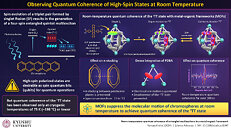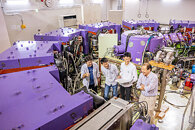T0@st
News Editor
- Joined
- Mar 7, 2023
- Messages
- 2,343 (3.33/day)
- Location
- South East, UK
Quantum coherence at room temperature has been achieved, thanks to the efforts of Associate Professor Nobuhiro Yanai and his research team at Kyushu University's Faculty of Engineering. Additional credit goes to Associate Professor Kiyoshi Miyata (also of Kyushu University) and Professor Yasuhiro Kobori of Kobe University, all in Japan. Their scientific experiments have led to an ideal set of conditions where it is "crucial to generate quantum spin coherence in the quintet sublevels by microwave manipulation at room temperature." A quantum system requires operation in a stable state over a certain period of time, free of environmental interference.
Kobori-san has disclosed multi-department research results in a very elaborate document: "This is the first room-temperature quantum coherence of entangled quintets." The certain period of time mentioned above was only measures in nanoseconds, so more experimental work and further refinement will be carried out to prolong harmonious conditions. Head honco, Professor Yanai outlined some goals: "It will be possible to generate quintet multiexciton state qubits more efficiently in the future by searching for guest molecules that can induce more such suppressed motions and by developing suitable MOF structures...This can open doors to room-temperature molecular quantum computing based on multiple quantum gate control and quantum sensing of various target compounds."



View at TechPowerUp Main Site | Source
Kobori-san has disclosed multi-department research results in a very elaborate document: "This is the first room-temperature quantum coherence of entangled quintets." The certain period of time mentioned above was only measures in nanoseconds, so more experimental work and further refinement will be carried out to prolong harmonious conditions. Head honco, Professor Yanai outlined some goals: "It will be possible to generate quintet multiexciton state qubits more efficiently in the future by searching for guest molecules that can induce more such suppressed motions and by developing suitable MOF structures...This can open doors to room-temperature molecular quantum computing based on multiple quantum gate control and quantum sensing of various target compounds."



View at TechPowerUp Main Site | Source

